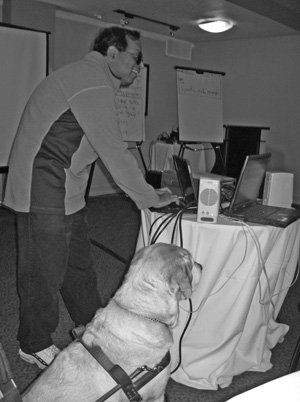Experts Meet at Web Accessibility Capacity Building Institute

From November 29 to December 1, DO-IT hosted a Web Accessibility Capacity Building Institute (CBI) in downtown Seattle. The purpose of the CBI was to identify accessibility problems and solutions related to emerging web applications and the technologies used to create them. Technologies such as AJAX and Adobe Flash are becoming more common on the web for creating engaging, interactive web applications. Unfortunately, these applications present barriers to some users, especially people using assistive technologies such as screen readers, screen magnification, and speech recognition software.
Institutions of higher education are exploring and beginning to utilize rich media technologies to improve functionality and usability of both academic and administrative web services, but by doing so they may risk excluding students and employees with disabilities from the content presented.
Participants at the CBI included representatives from the World Wide Consortium (W3C), IBM, Google, Yahoo!, Adobe, and GW Micro, as well as twenty-seven web managers and programmers from eleven colleges and universities. Participants spent three days exploring problems and solutions through presentations, panels, interactive problem solving sessions, and extensive group discussion. CBI Proceedings are available at www.washington.edu/doit/cbi/webaccess/proceedings.html.
The CBI was funded by DO-IT's Northwest Alliance for Access to Science, Technology, Engineering, and Mathematics (AccessSTEM), which is funded by the National Science Foundation (cooperative agreement #HRD-0227995). AccessSTEM serves to increase the successful participation of people with disabilities in STEM careers.